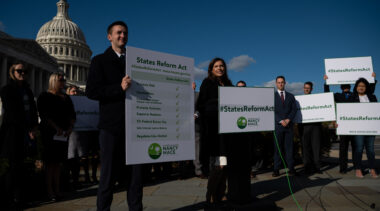Geoffrey Lawrence is research director at Reason Foundation.
Lawrence has been a financial executive in both the public and private sectors and has served as chief financial officer of publicly traded, growth stage, and startup manufacturing and distribution companies. He was CFO of Players Network, the first fully reporting, publicly traded marijuana licensee to be listed on a U.S. exchange, CFO of C Quadrant, a startup manufacturer and distributor that was subsequently sold to Lowell Farms (LOWL), CFO of Apex Extractions, a manufacturer and distributor based in Oakland that he helped take public, and, most recently, CFO of Claybourne Co., a top-3 flower brand in California by market share. Through these roles, Lawrence raised capital, planned capital expenditure, prepared financial forecasts, implemented systems for accounting and inventory control, designed internal control processes, managed monthly and quarterly closings and reporting, managed compliance with state and local regulations, negotiated contracts, and prepared filings with the U.S. Securities and Exchange Commission.
Lawrence also served as a senior appointee to the Nevada Controller’s Office, where he oversaw the state’s external financial reporting. Prior to joining Reason Foundation in 2018, Lawrence had also spent a decade as a policy analyst on labor, fiscal, and energy issues between North Carolina’s John Locke Foundation and the Nevada Policy Research Institute.
Lawrence is additionally the founder and president of an accounting and advisory firm with particular expertise in the licensed cannabis industry and public markets.
Lawrence holds an M.S. and B.S. in accounting from Western Governors University, an M.A. in international economics from American University, and a B.A. in international relations from the University of North Carolina at Pembroke. He lives in Las Vegas with his wife and two children and enjoys baseball and mixed martial arts.
-
First Circuit makes clear cannabis is subject to interstate commerce clause
State restrictions on the free movement of persons and capital, even in the cannabis industry, are unconstitutional.
-
Interstate trade in cannabis should begin immediately
All states with regulated cannabis markets prohibit the transfer of any cannabis inventory across state lines.
-
California repeals cannabis cultivation tax
California has just made tremendous progress in trying to turn around its regulated cannabis market, and more could soon be on the way.
-
North Carolina House won’t take up bipartisan medical marijuana bill passed by State Senate
North and South Carolina are among the last remaining bastions of medical marijuana prohibition in America.
-
Consumers say price and availability are barriers to choosing legal cannabis products over illicit products
Consumers say they are far more likely to opt for legal cannabis if the prices are comparable to those of illegal alternatives.
-
Eliminating the cultivation tax would help California’s legal cannabis industry compete with the illicit market
Eliminating the cultivation tax would allow farmers and licensed cannabis retailers to lower prices, making the legal marijuana market more competitive with illicit markets.
-
California should eliminate the cannabis cultivation tax and reduce the retail excise tax
Reducing taxes would make legal cannabis products more price-competitive with illicit markets and attract more consumers to the state's regulated market.
-
California complicates state’s struggling legal marijuana system with more rules
The changes would make it even more costly and burdensome for cannabis industry businesses to operate in California’s legal marijuana market.
-
New Hampshire bill would legalize marijuana but create a state-run monopoly to sell it
New Hampshire should legalize marijuana but the private sector is far more equipped to effectively serve consumers.
-
Oregon moves ahead on legal psychedelic therapy rules
Many eyes will be fixed on Oregon over the next few years as it pioneers an approach to legal therapeutic psilocybin use that could become a model for other states.
-
Fearmongering about crack pipes aims to undermine effective harm reduction policies and safe injection sites
Based on actual data, it’s difficult to argue against the effectiveness of supervised injection sites and other harm reduction approaches as the preferred method for combating drug abuse and reducing overdose deaths.
-
Mississippi’s medical marijuana disaster
After a popular ballot initiative to legalize medical marijuana was struck down, Mississippi policymakers struggle to devise a legislative solution.
-
How federal marijuana legalization would help Colorado
Federal control over the banking system has precluded legitimate marijuana businesses from obtaining bank accounts and insurance.
-
California cannabis coalition tells state leaders their industry is collapsing
California's complex regulatory system and high tax rate for marijuana products are pushing buyers and sellers to the black market.
-
It is past time to restore justice to victims of the drug war
Analysis shows the State Reform Act could reduce the federal inmate population by 2,807 individuals by 2027.
-
States Reform Act would help California’s struggling legal marijuana market
Proposed federal legalization legislation would allow California’s legal cannabis businesses to compete in an interstate marketplace.
-
Republican-backed marijuana bill is an important step toward legalization
For legalization to become a reality, a broad bipartisan Congressional coalition of support is necessary.
-
Some Pennsylvania lawmakers seek to move marijuana legalization, criminal justice reforms
Multiple proposals to legalize marijuana for adult use started circulating in the Pennsylvania legislature after Republican State Sen. Mike Regan announced he has changed his position on the issue.


















